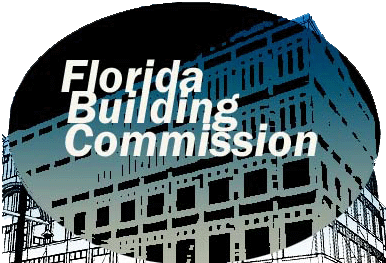|
|
Title...
Subtitle
- Stuff and Things
History
...
of
the Florida Building Commission

Topics
Florida Building Commission Statement on Reorganization of State Government Building Construction Programs
History
A Statewide Solution for a Statewide Problem
The
Legislature Mandates the Development of a New
Building
Code System with HB 4181
Foundations
The Code Will Be Supported By Improved Training,
Education
Amendment and Compliance
Procedures
Updates
and Amendments
Product
Evaluation and Approval
Links
Florida
Building Commission Website
Building
Code Ordering or View the Code Online
Commission Committees
Commission Meetings
Building Code Information System
Related Links
Links
page from the Florida Building Commission Website
History
When Hurricane Andrew tore apart South Florida, it exposed more than
the interiors of thousands of homes and businesses. The storm also revealed
a serious statewide problem: our antiquated system of locally-administered
building codes and building code compliance and enforcement.
Thousands
of homes and other structures simply didn't stand up to the storm as
well as they should have, and the effects quickly rippled out from South
Florida to the rest of the state.
Andrew broke all records for insurance losses, and was the direct cause
of Florida's worst insurance crisis in history. Insurers suddenly realized
that all of their worst-case predictions were grossly understated -
Florida was seriously underinsured and overexposed.
In the aftermath, many insurers simply pulled out of Florida and those
that stayed felt it necessary to raise rates to staggering new levels
in order to avoid the very real risk of sudden bankruptcy following
another huge storm. Homeowners all over Florida were affected as they
saw their rates rise drastically and found a lack of available new insurance
threatening to pull the plug on development in every part of the state.
The secret was out. Building codes and their administration and enforcement
was a statewide issue, with statewide implications. Poor compliance
or enforcement in a single county could (and did) wreak havoc with homeowners,
developers and commercial interests in every corner of the state.
Return to Top
A Statewide Solution for a Statewide Problem
Andrew was Florida's wake-up call. It was clearly time to begin
to make Florida far more resistant to destruction from natural disasters
such as Andrew. The manner in which so many neighborhoods had simply
blown to pieces drew attention to the building code system. Did Florida
need a stronger code? Or was the problem compliance? Subsequent investigation
quickly uncovered a pattern of widespread code violations which led
to catastrophic structural failures. In July of 1996, the Florida Building
Codes Study Commission was established to evaluate the existing system
and to recommend ways to improve or reform the system if they found
it necessary. During 16 months of study, what the commission found was
a complex and confusing patchwork system of codes and regulations developed,
amended, administered and enforced differently by more than 400 local
jurisdictions and state agencies with building code responsibilities.
In the case of Hurricane Andrew, the problem was not weakness in the
codes themselves that contributed to the extensive storm damage. Rather,
it was the inability to enforce and comply with the confusing system
of multiple codes and administrative processes. It had become clear
that Florida needed a single, statewide building code system, and the
Commission and the Legislature saw to it that Florida would get it.
Return to Top
The Legislature Mandates the Development of a New Building Code System
with HB 4181
The Report of the Building Codes Study Commission made a number
of specific recommendations for reforming the building codes system,
centered around the concept of a single statewide code. The 1998 Legislature
adopted the concept and most of the recommendations as part of House
Bill 4181. The law directed the development of the Florida Building
Code and instructed that recommendations of the Governor’s Building
Code Study Commission be considered during the development.
Return to Top
Foundations
The Florida Building Code was authorized by the 1998 Florida Legislature
to be the sole document incorporating all building standards adopted
by all enforcement agencies and state agencies that license different
types of facilities.
This code was developed and will be, updated and maintained by a state
commission whose goal the law directs to be the consistency of standards
throughout the state and full accessibility to information on the standards.
The law allows for differences in the standards in different locales
based on compelling differences in physical conditions. However, it
establishes procedures for administration of the Code at all levels
that will constrain unwarranted differences and ensure the availability
of information on local differences to all parties throughout the state
and nation.
The law established the Florida Building Commission as the body which
is responsible for the development of the Code and the other elements
of the system which support its implementation. The Commission has 23
members representing Engineers, Architect, Contractors, Building Owners
and Insurers, State and Local Government and Persons with Disabilities.
The Chairman is Appointed by and serves at the pleasure of the Governor.
Return to Top
The Code will Be Supported by Improved Training, Education, Amendment
and Compliance Procedures
The single statewide Code is the heart of the New Building Code
system but it is just one component of an integrated approach to improving
the safety and efficacy of the built environment in Florida. In addition
to the Code, a networked education and training system and a uniform
system for the approval of products statewide will be established for
the first time. Also, procedures are established by law for appealing
the validity of locally adopted amendments to the Code and local interpretations
of the Code to the state Commission and for obtaining binding interpretations
of the Code from the Commission. The purpose of these new systems and
procedures is to generate consistency in requirements throughout the
state. Consistency is necessary for achieving the level of knowledge
and skill essential to good compliance with the Code.
Knowledge is fundamental, but compliance with the Code also depends
on incentives to adhere to the its requirements. Under the new system,
designers and contractors will be penalized for repeated violations
of code requirements through assessment of quadrupled re-inspection
or plans review fees for third violations of the same requirement. Also,
violations of code requirements that pose a significant threat to the
health or safety of building occupants or substantial degradation of
a building’s systems will subject licensed designers and contractors
to fines of between $500 and $5,000, and disciplinary action against
their license. All fines and disciplinary action will be recorded on
an automated information system for review by permitting jurisdictions.
Return to Top
Updates and Amendments
By the Florida Building Commission
The Florida Building Code will be updated every three years by the Florida
Building Commission. (Please see the following section for discussion
on this Commission). The Florida Building Commission may amend the code
once each year to incorporate interpretations and update standards upon
a finding that delaying the application of the amendment would be contrary
to the health, safety and welfare of the public or the amendment provides
an economic advantage to the consumer.
By Local Governments (amendments only)
Local governments may amend the code no more than once each six months.
However, any local amendment must address a unique local condition and
be more stringent than the Florida Building Code. To ensure that the
criteria is met, the issues of whether the amendment addresses a unique
condition and is more stringent are appealable to the Florida Building
Commission. All locally adopted amendments must be transmitted to the
Florida Building Commission within 30 days of adoption. The Commission
and each local government is responsible for keeping those amendments
in a usable format. Adopted local amendments are repealed or incorporated
into the code every three years, upon the updating of the Florida Building
Code. Local amendments will apply to state or school district owned
buildings, manufactured buildings approved by the Florida Building Commission,
or prototype buildings approved by the Florida Building Commission.
All proposed amendments to the code by either the Commission or a local
government must contain a Fiscal Impact Statement.
Interpretations
Interpretations of the Florida Building Code will be made by the local
government plans examiner during the plan review process and by the
local government building inspector during the construction process.
Any disagreement regarding the interpretation will be resolved first
by the building official then by a local board of appeal (if one exists)
and finally, by appeal to the Florida Building Commission.
Prototype Plans
In order to streamline the permitting process for state- owned buildings,
the Florida Building Commission may provide plans review and approval
of prototype buildings owned by public entities (e.g., schools, correctional
facilities, and state-owned office buildings). Approved prototypes will
be subject to permitting and inspections by local government, but will
be exempt from the local government plan review.
Return to Top
Product Evaluation and Approval
All Products must comply with standards established by the code
and their use must be approved by the Building Official. Alternatively,
certain new products and panel walls, external doors, roofing, skylights,
windows, shutters and certain structural components may obtain approval
by the commission for statewide use as appropriate.
The Florida Building Commission is developing uniform requirements for
product evaluation and approval which will rely upon national and international
consensus standards for demonstrating compliance with the Florida Building
Code. The Commission will approve product evaluation entities testing
laboratories, certification agencies, and quality assurance entities
which will have the responsibility of determining products, methods
and systems compliance with the code and certifying compliance to the
Commission. Once a product, method or system has received Commission
approval based on such certification, it can be used statewide as appropriate
without further evaluation. A local building official may deny the use
of a product if he does so in writing substantiating the fact that the
product application is inconsistent with the statewide approval. That
denial is reviewable by a local board of appeal (if one exists) and
then by the Florida Building Commission. The Commission's statewide
approval is also subject to review. A product may be approved for local
use only by a local jurisdiction.
Return to Top
|



